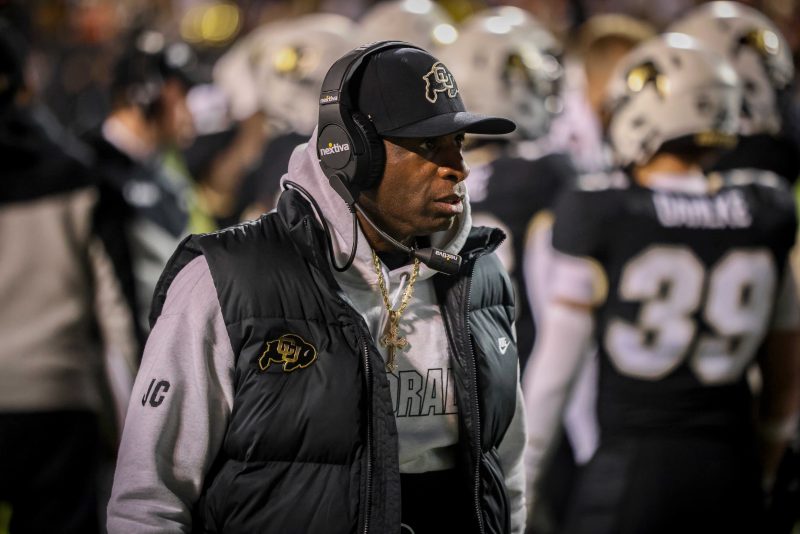BOULDER, Colo. – Colorado head football coach Deion Sanders did what he thought was necessary this week even if it seemed a little desperate. After losing four of his previous five games, he reorganized his coaching staff and promoted a former NFL head coach to play-calling duties in a bid to bring out the best in his star quarterback son.
But it didn’t work. In fact, the Buffaloes got even worse Saturday against No. 19 Oregon State until the very end, when they scored their only two touchdowns of the game before falling short, 26-19.
Colorado quarterback Shedeur Sanders even needed another painkiller injection to finish the game as the Buffs dropped to 4-5 this season after capturing the nation’s attention with a 3-0 start.
“This is hard,” Deion Sanders said afterward. “The reason it’s so hard is because you know you’re capable of doing better − playing better, performing better, calling better games, coaching better on my behalf. And you are coming up short when you have enough to get the job done. And it’s painful. It hurts myself, the team and all the coaches and fans.”
As it turned out, a coaching blunder right before halftime ended up being the difference in the game. Deion Sanders blamed himself for it. But the Buffs still struggled to protect their quarterback in the first three quarters before he went to the locker room to get his painkiller shot. After that, he said he “got mad” and nearly brought his team back from a 23-5 fourth-quarter deficit in front of a sold-out homecoming crowd at Folsom Field (52,725).
What else did Deion Sanders say?
He explained why he promoted former New York Giants and Cleveland Browns head coach Pat Shurmur to call plays on offense instead of offensive coordinator Sean Lewis.
Shurmur had been making an annual salary of $50,000 as an analyst at Colorado behind the scenes, according to a copy of his appointment letter obtained by USA TODAY Sports. But after this big change, he’s now one of the team’s 10 full-time assistant coaches and has the title of co-offensive coordinator with Lewis, who gave up his job as head coach at Kent State last year to run the offense at Colorado for $850,000 this year.
“We’re not gonna demean Sean Lewis,” Deion Sanders said when asked about making Shurmur the play-caller instead of Lewis. “We’re not gonna do that. We’re not gonna take that tone. Sean is a good man. I think he’s a good play-caller. We just needed change at the time. We just needed to try something else at the time, and that’s what we did. I don’t look back on it. I don’t second-guess myself whatsoever, because it’s more to it than what you may know.”
Deion Sanders said the play-calling system is “still a group effort” and both Lewis and Shurmur are “really talented.”
“It’s not one guy doing good, or one guy doing bad,” he said.
Before Saturday, the Buffs ranked second in the nation with the most sacks allowed with 42, one year after they only had 23 during a season in which they finished 1-11. They also had the third-worst rushing offense in the nation with just 78.6 yards per game.
On Saturday, Shedeur Sanders was sacked four more times and his team gained minus-7 rushing yards on 19 carries.
What happened in the game?
Despite the shakeup on the coaching staff, the offensive linemen on the field were still the same and acted like it with more porous protection for Shedeur Sanders.
The Buffs gained only 52 yards of total offense on 30 plays before halftime, when they trailed 14-3. They also punted five times on their first seven possessions, fumbled the ball away on another and got a 32-yard field goal for their only score. The latter happened only after Colorado safety Shilo Sanders forced a fumble to give the Buffs’ offense possession at the Oregon State 19-yard line.
By the time the team went into the locker room at halftime, Shedeur Sanders appeared to be walking with a limp and Deion Sanders was blaming himself for a strategic gaffe that led to a touchdown by Oregon State with 16 seconds left in the second quarter.
“That’s on me,” Deion Sanders told ESPN at halftime.
What was the mistake?
Colorado got the ball at its own 4-yard line with 49 seconds left before halftime down by only 7-3. If the Buffs had run the ball and run out the clock, that would have been the score at halftime.
Instead, Shedeur Sanders set up as if he was going to try to drive the length of the field to score. He attempted two passes that fell incomplete on first and second down before handing the ball off for no gain on third down − finally forcing the Beavers to burn one of their two remaining timeouts with 36 seconds left.
Colorado then punted on fourth down, setting up a quick-strike score by the Beavers right before halftime.
Why didn’t the Buffs just run down the clock and avoid giving the Beavers the ball to score?
“We wanted to get out of there, because we knew were receiving the ball in the second half,” Deion Sanders said. “So the plan was to either get a first down and try to go, or if we don’t, if we’re not successful on first down, OK, let’s hit the clock.”
That’s not how it worked out. Oregon State got the ball on the Colorado 20-yard line with 21 seconds left after a 28-yard punt return.
One play later, Oregon State quarterback DJ Uiagalelei tossed the ball down the right sideline to running back Deshaun Fenwick for a 20-yard touchdown with 16 seconds left in the half.
The touchdown ended up being the difference in the game. Instead of being down by just 7-3 at halftime, the Buffs were down 14-3.
“You know that was huge in a lot of ways,” Oregon State head coach Jonathan Smith said.
Deion Sanders knew it, too.
“They were able to punch it in, which is crazy,” he said. “That hurt tremendously.”
Oregon State’s momentum then carried into the second half, when the Beavers went 85 yards on 12 plays on their first drive to take a 20-3 lead on a 1-yard rush by Uiagalelei.
What happened at the end of the game?
Shedeur Sanders went into the locker room to get his painkiller injection with about three minutes left in the third quarter. He didn’t miss any action on the field and returned to lead his team on touchdown drives on the Buffs’ very last two possessions of the game. Their first touchdown was a 15-yard pass from Shedeur Sanders to two-way star Travis Hunter, which helped cut Oregon State’s lead to 23-12 with 10:41 remaining.
It didn’t come until Colorado’s 11th possession of the game after seven punts and a lost fumble before that.
“I just got mad,” Shedeur Sanders said. “That’s it.”
He said he never considered leaving the game because ‘the pain of not being there for them overrides the pain’ he felt in his body. On his next possession, he again led the Buffs down the field to score in nine plays, capped by a 12-yard touchdown pass to running back Anthony Hankerson with 1:42 left. But it was too little, too late.
Afterward, he downplayed the change in play-callers but said “overall, I liked it.”
The Beavers (7-2) outgained the Buffs in yardage 418-238. Of those 238 total yards, 160 for Colorado came in the fourth quarter. Shedeur Sanders finished with 24-of-39 passing for 245 yards and two touchdowns.
Uiagalelei was 12-of-24 for 223 yards and one touchdown.
What’s next for Deion Sanders and Colorado?
Deion Sanders said his team is missing the “passion” it had in the beginning of the season. But he found a silver lining as his team enters the final three games of the regular season, starting next week with the home finale against Arizona. They need to win two to be eligible for a postseason bowl game.
“Our kids fought hard,” he said. “They really did. And I love the fact that they didn’t have any quit in them, that they rallied at the end and gave a heck of a effort. We just wish that we could do that in the midst of the game.”
Regardless of who’s calling the plays, he’s still got the same offensive line. On the other hand, he’s still got Shedeur at quarterback. On Saturday, he again showed he can carry the team on his back, at least as long as he can last.
“The kid is tough,” his father said. “He’s tough. He’s fighting through it, and he don’t make any excuses. He wasn’t raised like that. We’re not making any excuses. We don’t do that.”
What else did Deion Sanders do to his staff?
To make room for Shurmur on a coaching staff that is limited to 10 by NCAA rules, Sanders was required to remove a current assistant coach and demote him to analyst. Colorado tight ends coach Tim Brewster is making that downward move, though Sanders said he doesn’t consider it a demotion “because everyone is making the same amount of money.” Brewster, a former head coach at Minnesota, is making $400,000 this year at Colorado.
Colorado was only using one tight end, making Brewster a logical candidate to move to analyst.
‘It’s a movement that we had to make,’ Deion Sanders said.
Follow reporter Brent Schrotenboer @Schrotenboer. Email: bschrotenb@usatoday.com





